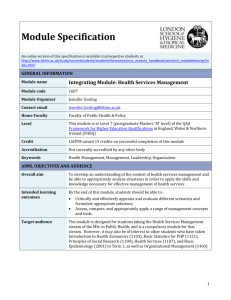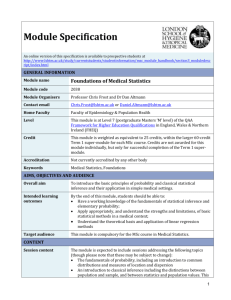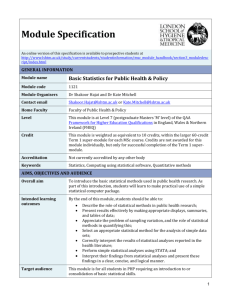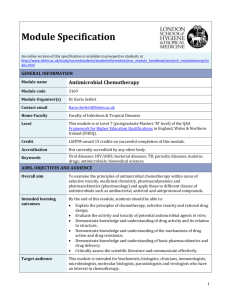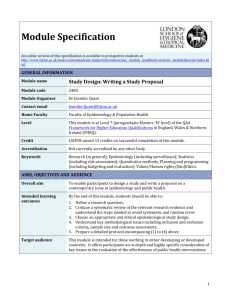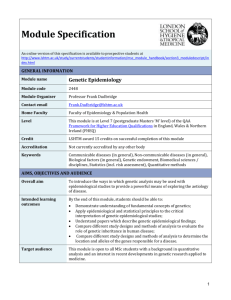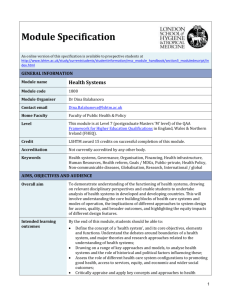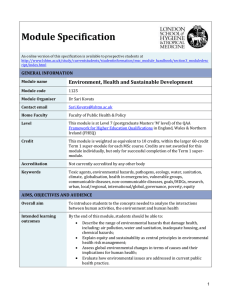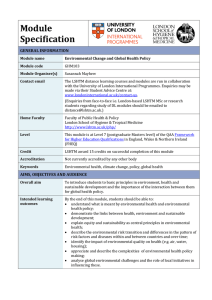1702 Proposal Development Module Specification
advertisement
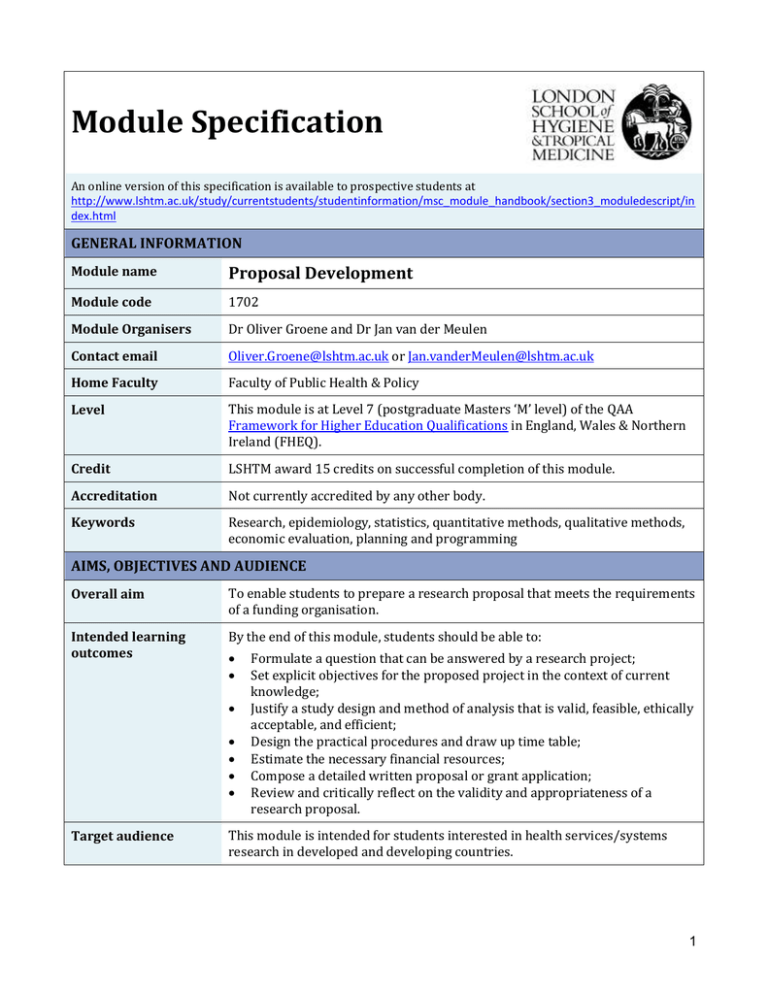
Module Specification An online version of this specification is available to prospective students at http://www.lshtm.ac.uk/study/currentstudents/studentinformation/msc_module_handbook/section3_moduledescript/in dex.html GENERAL INFORMATION Module name Proposal Development Module code 1702 Module Organisers Dr Oliver Groene and Dr Jan van der Meulen Contact email Oliver.Groene@lshtm.ac.uk or Jan.vanderMeulen@lshtm.ac.uk Home Faculty Faculty of Public Health & Policy Level This module is at Level 7 (postgraduate Masters ‘M’ level) of the QAA Framework for Higher Education Qualifications in England, Wales & Northern Ireland (FHEQ). Credit LSHTM award 15 credits on successful completion of this module. Accreditation Not currently accredited by any other body. Keywords Research, epidemiology, statistics, quantitative methods, qualitative methods, economic evaluation, planning and programming AIMS, OBJECTIVES AND AUDIENCE Overall aim To enable students to prepare a research proposal that meets the requirements of a funding organisation. Intended learning outcomes By the end of this module, students should be able to: Target audience Formulate a question that can be answered by a research project; Set explicit objectives for the proposed project in the context of current knowledge; Justify a study design and method of analysis that is valid, feasible, ethically acceptable, and efficient; Design the practical procedures and draw up time table; Estimate the necessary financial resources; Compose a detailed written proposal or grant application; Review and critically reflect on the validity and appropriateness of a research proposal. This module is intended for students interested in health services/systems research in developed and developing countries. 1 CONTENT Session content The module is expected to include sessions addressing the following topics: Formulating an answerable question in the context of current knowledge; Selecting appropriate quantitative and qualitative methods (sampling techniques, data collections, required sample size, and methods of analysis); Making a detailed plan for all practical activities; Determine the resources required. TEACHING, LEARNING AND ASSESSMENT Study resources provided or required Reader, example research protocols, tutorial sessions. Teaching and learning methods During this module, the students will work on a proposal for a research project. Students need to have found a topic for this research project before the start of the module. General concepts and principles will be presented in five lectures that are scheduled in the first two weeks of the module. Students will discuss in groups led by a seminar leader their progress in the development of their own protocol. To provide the students with practical examples, there will be presentations of proposals that were developed in the module in previous years. The students will evaluate each other's work (peer review), the results of which can be used to improve the final proposals. Assessment details Each student will be required to submit a research proposal for assessment. This assignment will be used to evaluate the student’s ability to frame a research question (10 marks), set explicit objectives (20 marks), select and justify an appropriate design and method of analysis (20 marks), and plan practical procedures and draw up a time table (10 marks). When marking these components we will assess whether the structure is clear and logical, whether information is presented in a succinct manner, whether explicit arguments are given for design choices and whether the proposal demonstrates a critical approach with respect to methods and theory that underpins it. An extra 20 marks will be assigned for the general quality of the proposal (strength of arguments, clarity of text and lay out). The final 20 marks will be awarded for the quality of the peer review reports. For students who are required to re-sit, or granted a deferral or new attempt, the task will be to correct and revise the work from their original proposal. Assessment dates The critical appraisal of a scientific proposal needs to be handed in on a date TBC; peer-review reports are due on TBC. The deadline for handing in the final proposal is TBC. For students who are required to re-sit, or granted a deferral or new attempt, the next assessment deadline will be the standard School-recommended date in mid/late September 2016. Language of study and assessment English (please see ‘English language requirements’ below regarding the standard required for entry). 2 TIMING AND MODE OF STUDY Duration The module runs for 5 weeks at 2.5 days per week; this module runs between Wednesday lunchtime and Friday afternoon. Dates For 2015-16, the module will start on Wednesday 20 April 2016 and finish on Friday 20 May 2016. Timetable slot The module runs in LSHTM timetable slot E. Mode of Study The module is taught face-to-face in London. Both full-time and part-time students follow the same schedule. For full-time students, other LSHTM modules are available in the other half of the week for the C and D slots. Learning time The notional learning time for the module totals 150 hours, consisting of: Contact time ≈ 24 hours Directed self-study ≈ 58 hours Self-directed learning ≈ 38 hours Assessment, review and revision ≈ 30 hours APPLICATION, ADMISSION AND FEES Pre-requisites Students attending this course will be expected to have taken Reviewing the Literature (1701) module. English language requirements A strong command of the English language is necessary to benefit from studying the module. Applicants whose first language is not English or whose prior university studies have not been conducted wholly in English must fulfil LSHTM’s English language requirements, with an acceptable score in an approved test taken in the two years prior to entry. Applicants may be asked to take a test even if the standard conditions have been met. Student numbers Student numbers are typically 20 per year; numbers may be capped due to limitations in facilities or staffing. Student selection Preference will be given to LSHTM MSc students, particularly those registered for specific courses or who have taken specific prior modules, where applicable, and LSHTM research degree students. Other applicants meeting the entry criteria will usually be offered a place in the order applications are received, until any cap on numbers is reached. Applicants may be placed on a waiting list and given priority the next time the module is run. Full Registration (full participation) by LSHTM research degree students is required for this module. Fees For registered LSHTM MSc students, fees for the module are included within MSc fees (given on individual course prospectus pages). If registering specifically for this module, as a stand-alone short course, individual module fees will apply. Tuition fees must be paid in full before commencing the module, or by any fee deadline set by the Registry. Scholarships Scholarships are not available for individual modules. Some potential sources of funding are detailed on the LSHTM website. 3 Admission deadlines For 2015-16: For registered LSHTM MSc students, the module choice deadline (for Term 2 and 3 modules) is Friday 20 November 2015. If registering specifically for this module, applications may be made at any time but, as places are limited, applications ahead of the MSc deadline are strongly advised. All applications should be submitted at the latest 8 weeks prior to the start of the module. Formal registration will take place on the morning of the first day of the module. ABOUT THIS DOCUMENT This module specification applies for the academic year 2015-16 Last revised 10 July 2014 by Oliver Groene; Minor amendments 20 July 15 SDB London School of Hygiene & Tropical Medicine, Keppel St., London WC1E 7HT. www.lshtm.ac.uk 4
